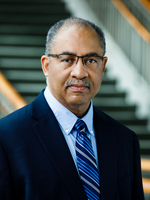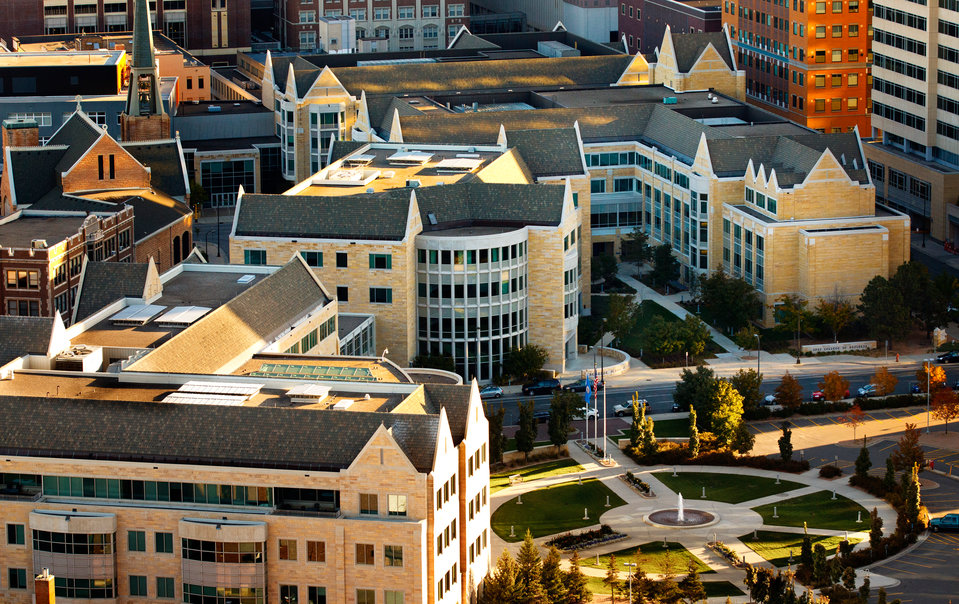Things are a lot different when you factor in the cold.
For Atlanta native and 2L student Kailey Meadows, that wasn’t a realization until she moved to Minnesota to attend the School of Law.
“I never thought about the danger of someone not having a home, freezing to death. That’s not a consideration in the South,” she said. “Housing is a much bigger crisis up here in the winter; there’s a different sense of urgency.”
Meadows felt that urgency last year as she worked with the School of Law’s Community Justice Project (CJP), which offers opportunities for students to integrate the school’s mission into their clinic experience as they work for justice and reconciliation. Started in 2007 under the leadership of former Professor Nekima Levy-Pounds, CJP and the St. Paul chapter of the NAACP formed a partnership to work collaboratively on behalf of communities of color to challenge laws and policies that negatively impact these communities.
Meadows worked last semester on two different projects – one related to housing, the other to the juvenile justice system.
“For a lot of us as students, these are not things that are in our face every day, because we are insulated from all these things while we’re in school,” Meadows said. “You read these cases and it’s hard to put yourself in these shoes, but in this work with the CJP, seeing and talking to these community members … the issues become real very quickly.”
Creating connections with fellow community members permeates the CJP’s spirit. In the program’s description, this spirit is represented by the sub-Saharan African phrase “ubuntu,” which Archbishop Desmond Tutu translated as “My humanity is inextricably bound up in yours.”
As that human connection is realized, the desire to make a positive impact on others’ experiences becomes a natural extension.

Carl Warren
“One of the things that excites me most is the opportunity to raise students’ awareness not only about social justice issues, but about their ability to have an impact, even as students. There’s nothing more satisfying than to see that ‘aha’ moment as they see they can make a difference in their community,” said Carl Warren, CJP director. “When they do fully realize the impacts of these issues, it’s almost like a fire is lit. They become quite passionate and dedicate themselves to trying to make a difference, trying to create change. I see that every semester.”
Many issues, many opportunities
In both identifying issues and working toward solutions, the CJP focuses on bridge building with community stakeholders, specifically aimed at improving the lives of the African American community in the Twin Cities.
That process starts with engaging the community – and monitoring media and other communication channels – to identify issues that are impacting people’s lives. Warren and his students research the issue and identify potential community partners to collaborate with to explore solutions. As issues and partnerships are identified, students build relationships aimed at making an impact on real community issues.
“Giving students the opportunities to have experience in this or other areas of real practice equips them for the work they will be doing after they graduate,” Warren said. “Education is only meaningful when it ultimately applies to real life. It’s one thing to be learning about a topic such as social justice; it’s another thing to be engaged in it. The most effective teacher is experience.”
The range of issues and partnerships over the clinic’s 14-year history has been huge: Last semester alone students worked on 13 different projects, ranging from working with the Minnesota Department of Human Rights in its investigation with school districts and charter schools across the state to reverse the disproportionate discipline of students of color, to the Harriet Tubman Center and its work with low-income youth.
Two former CJP student attorneys recently were praised by Alex Migambi, the state disproportionality specialist in the Minnesota Department of Education. Amanda Harrington and Dustin Cesarek had worked to improve state technical assistance for students of color with disabilities.
“I’m happy to let you know that your work and research was featured in a presentation to the Special Education Division Leadership,” Migambi said. “These recommendations also will be adopted into a report that is going to the Legislature.”
Students gain a valuable set of skills and formative experiences through the CJP.
“Not only do they learn through research, but they have the opportunity to actually have practical, day to day experience with people who are being impacted by the social justice issue in question. People who are on the ground, grassroots, trying to make a difference in these areas. They’re working with them as colleagues,” Warren said. “There’s nothing more cogent than having that type of experience.”
2L student Mariah Zell worked last semester on the long-standing project Prison Phone Justice, which the School of Law Center for Race, Leadership and Social Justice Director Artika Tyner ’06 J.D., ’10 MA, ’12 EdD has focused on for more than a decade. The project aims to raise awareness and drive policy change around the inflated fees for phone calls from jail and prison, which run as much as $24 for a 15-minute call in some states. (Minnesota’s highest rate is more than $12 for a 15-minute call.)
“It really does tie into this brutal cycle of incarceration. A lot of people [in jail or prison] are lower income and don’t have the resources to make these phone calls,” Zell said. “A big part of avoiding recidivism is being able to grow and stay in contact with outside community, and a big part of that is through phone calls. Because the rates are so high, a lot of people can’t stay in contact with their community, family, friends, jobs, community groups. That isolates people, which leads to the cycle continuing.”
“[This work] really opened my eyes to how big the community is, not just in Minnesota but across the nation, and the people who recognize this is an issue and who are working to dismantle it just a bit more,” Zell added. “There are a bunch of different groups focusing not just on this issue, but on other parts of the prison system and issues within it. Realizing there are a lot more people working toward these goals was a very eye-opening and humbling experience. The work I did over a short period of time didn’t solve this issue by any means, but working with so many people to take steps closer to solutions was a powerful thing.”
‘A greater whole’
Students generally work one semester at a time (although many students continue working with the CJP for two or more semesters), so they contribute to sustained efforts to impact change on any given issue.
“There’s this perception the law moves really slowly – that it’s a lot of paper pushing. The CJP’s work helps emphasize that as you talk with clients – and it could be around housing, juvenile justice, any number of issues – you realize face to face with someone that this paperwork needs to get done, that this policy needs to get written, because there are people being affected by this today. Right now, right in front of you. It puts a face to what you’re doing and why you’re doing it,” Meadows said. “There’s always someone who’s going to need help. Seeing those faces makes you keep your emphasis where it should be, on those people, and helps keep your own spark up as you’re doing this work.”
Across its many clinics, the School of Law helps ensure that human emphasis. For students who work within the CJP, that emphasis means a growing understanding of their connectedness to the communities, and people, they serve.
As Tutu described in 1999, “A person with ubuntu is open and available to others, affirming of others, does not feel threatened that others are able and good, for he or she has a proper self-assurance that comes from knowing that he or she belongs in a greater whole and is diminished when others are humiliated or diminished, when others are tortured or oppressed.”
The cold presents a different issue, a different urgency, than for the Atlanta community in which Meadows grew up. As a Minneapolis resident and School of Law student, it’s no longer something Meadows doesn’t think about; it’s her issue now, too.
“You recognize it’s your job to give back, to extend a hand to your neighbor who needs help. What’s good for someone in the community is good for Minneapolis,” she said. “I want to make the city better as a whole, and I understand better [now] my place in that. The CJP enhances your legal education as well as your community.”
Ubuntu, indeed.





